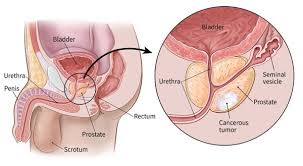What is Prostate Cancer Surgery?
Prostate cancer surgery is a specialized procedure to treat prostate cancer by removing the prostate gland, nearby tissues, and sometimes affected lymph nodes. It is the primary treatment for localized cancer, aiming to eradicate the disease and reduce the chances of recurrence. Advanced techniques such as robotic-assisted surgeries have redefined outcomes by minimizing side effects and enhancing recovery.
Causes and Risk Factors for Prostate Cancer
- Age: Prostate cancer is more common in men aged 50 and above.
- Genetics: Family history increases the risk.
- Diet and Lifestyle: High-fat diets and obesity contribute to higher risks.
- Ethnicity: African-American men are more prone to developing prostate cancer.
- Exposure to Chemicals: Long-term exposure to industrial chemicals or toxins can increase susceptibility.
Types of Prostate Cancer Surgery
1. Radical Prostatectomy:
- Complete removal of the prostate gland, seminal vesicles, and surrounding tissues.
- Commonly used for early-stage or localized cancer.
2. Robotic-Assisted Prostatectomy:
- A minimally invasive procedure performed with robotic systems like the Da Vinci Surgical System.
- Advantages include reduced blood loss, quicker recovery, and less post-operative pain.
3. Laparoscopic Surgery:
- Performed through small incisions using advanced laparoscopic equipment.
- Known for faster recovery and minimal scarring.
4. Transurethral Resection of the Prostate (TURP):
- A palliative surgery to ease symptoms caused by an enlarged prostate, particularly in advanced cancer cases.
5. Pelvic Lymph Node Dissection (PLND):
- Often performed alongside a prostatectomy to assess and remove cancerous lymph nodes.
Symptoms That May Require Surgery
- Difficulty urinating or a weak urine stream
- Frequent need to urinate, especially at night
- Blood in urine or semen
- Pain in the pelvis, hips, or lower back
- Persistent urinary tract infections
- Diagnosis of early-stage prostate cancer
Procedure Overview
Pre-Surgery Preparation:
- Complete evaluation, including blood tests, imaging scans (MRI/CT), and prostate-specific antigen (PSA) testing.
- Discontinuation of certain medications (e.g., blood thinners).
- Clear instructions for fasting before surgery.
During Surgery:
- The patient is given general or spinal anesthesia.
- Surgeons remove the prostate gland, surrounding tissues, and lymph nodes (if necessary).
- Robotic systems or laparoscopic instruments may be used for precision.
Post-Surgery:
- Use of a catheter for urination during initial recovery.
- Hospital stay of 1–3 days, depending on the type of surgery.
- Pain management and initial rehabilitation begin immediately.
Advanced Techniques in Prostate Cancer Surgery
- Nerve-Sparing Surgery:
- Focuses on preserving erectile and bladder function by avoiding damage to surrounding nerves.
- High-Precision Imaging:
- Integration of MRI or 3D imaging ensures accurate removal of cancerous tissue.
- Robotic Systems:
- Offer unmatched precision, reduced trauma, and minimal recovery time compared to traditional methods.
Post-Surgery Care
- Rehabilitation Programs:
- Focused on regaining bladder control and sexual function.
- Includes physical therapy and psychological support.
- Medications:
- Prescribed for pain relief and infection prevention.
- Lifestyle Modifications:
- Emphasis on a low-fat diet, weight management, and regular exercise.
- Follow-Up Appointments:
- Regular PSA testing and imaging scans to monitor recovery and recurrence risks.
Why Choose India for Prostate Cancer Surgery?
- Experienced Specialists: India is home to world-renowned urologists and oncologists.
- State-of-the-Art Facilities: Advanced technology, including robotic systems, at leading hospitals.
- Affordable Costs: Prostate cancer treatment in India costs 60–70% less than in Western countries.
- Comprehensive Care: From diagnosis to rehabilitation, hospitals provide holistic treatment.
- Medical Tourism Benefits: Assistance with travel, stay, and aftercare ensures a hassle-free experience.
Why Choose Healtour Solutions?
- Expert Consultation: Personalized consultations with leading urologists and oncologists.
- World-Class Hospitals: Access to top hospitals with advanced prostate cancer surgery options.
- Seamless Coordination: We handle all logistics, from medical appointments to post-op care.
- Comprehensive Packages: All-inclusive treatment packages at affordable prices.
- Patient Support: Emotional support and assistance with visa, travel, and accommodation.
- Cost-Effective Treatment: High-quality treatment at a fraction of the cost of Western countries.
- Transparent Pricing: No hidden costs—clear, all-inclusive pricing.
- Recovery Assistance: Post-surgery follow-up and rehabilitation support.
- Multilingual Support: Assistance in multiple languages for easier communication.
- Global Reach: Trusted by patients worldwide for successful outcomes.
Benefits of Prostate Cancer Surgery
- High success rates for localized cancer.
- Improved bladder control and urinary function over time.
- Reduced cancer recurrence risk with complete tumor removal.
- Advanced techniques minimize scarring and recovery time.
Emotional and Psychological Support
Prostate cancer surgery can have significant psychological impacts, including concerns about sexual health and quality of life. Indian hospitals emphasize:
- Counseling Sessions: For patients and their families to navigate emotional challenges.
- Support Groups: Interaction with other patients for shared experiences and motivation.
- Dedicated Rehabilitation Teams: Focused on holistic recovery, both physically and emotionally.
FAQs
- What is the recovery time for prostate cancer surgery?
- Recovery varies but typically takes 4–6 weeks for open surgery and 2–4 weeks for robotic-assisted surgery.
- Is robotic-assisted prostate surgery better?
- Yes, it offers better precision, reduced blood loss, minimal scarring, and quicker recovery.
- Are there long-term side effects of prostate cancer surgery?
- Temporary incontinence and erectile dysfunction may occur, but they usually improve over time with therapy.
- Can prostate cancer come back after surgery?
- While rare, recurrence is possible. Regular follow-ups and lifestyle changes help reduce risks.
- What are the chances of complete recovery?
- Early-stage prostate cancer has a high success rate of over 90% with surgery.
- How soon can I return to normal activities post-surgery?
- Most daily activities can resume within 2–4 weeks, though strenuous activities should be avoided for longer.
- Will prostate surgery affect my sexual function?
- Temporary erectile dysfunction may occur, but nerve-sparing surgery often preserves sexual function.
- What lifestyle changes should I make post-surgery?
- A balanced diet, regular exercise, and stress management are crucial for recovery.
- Can I travel for surgery to India?
- Yes, India is well-equipped for international patients, offering travel assistance and medical tourism packages.
- Do I need radiation therapy after prostate surgery?
- Radiation is only required if there’s evidence of cancer spread or incomplete tumor removal.




